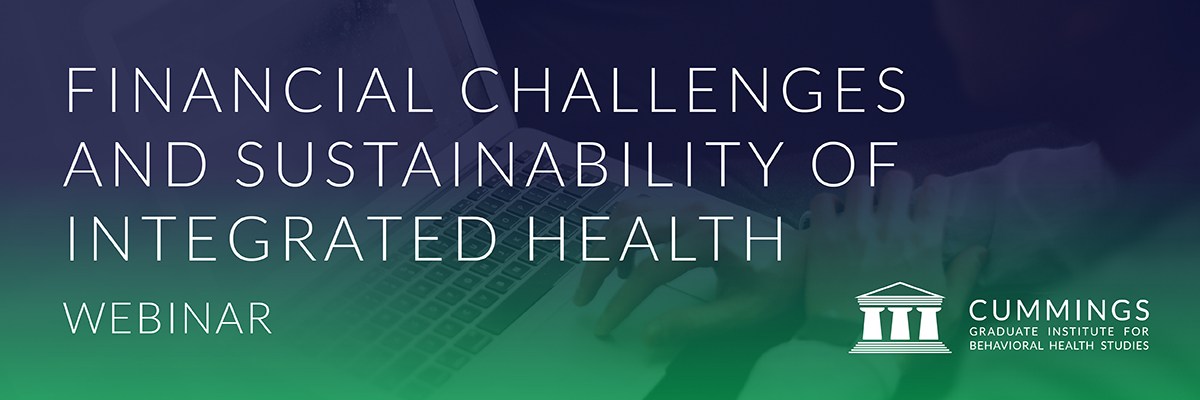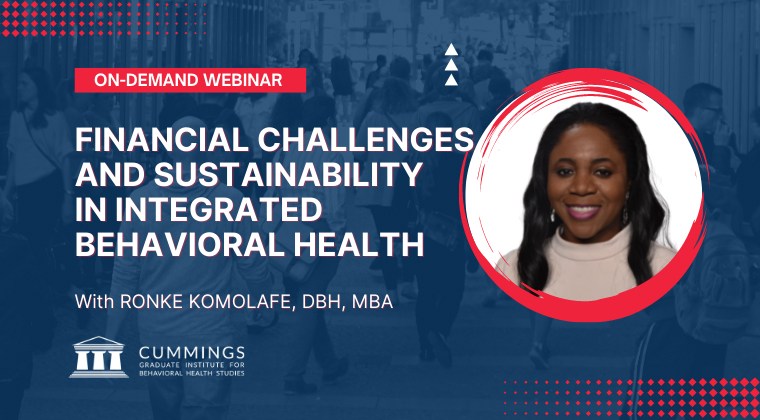 The Financial Challenges and Sustainability of Integrated Health webinar addresses overcoming barriers to the growth and expansion of an integrated care program. The emergence of payment models and value-based payments are temporary solutions to the sustainability of integrated health. Financing integrated care is a challenge for providers, fueled by the cost of developing and managing the program. Join us to learn action steps to increase the financial sustainability and the growth of an integrated health program. Financial sustainability and reimbursement of integrated health services by payers create competitive advantages that enable a sustainable system and growth.
The Financial Challenges and Sustainability of Integrated Health webinar addresses overcoming barriers to the growth and expansion of an integrated care program. The emergence of payment models and value-based payments are temporary solutions to the sustainability of integrated health. Financing integrated care is a challenge for providers, fueled by the cost of developing and managing the program. Join us to learn action steps to increase the financial sustainability and the growth of an integrated health program. Financial sustainability and reimbursement of integrated health services by payers create competitive advantages that enable a sustainable system and growth.
The Financial Challenges and Sustainability of Integrated Health webinar is available as an online, on-demand training course with CE credit.
Purchase the webinar
 Learning Objectives
Learning Objectives
- Recognize how to resolve challenges of integrated health
- Identify how to expand and grow an integrated health program
- Identify how to increase the financial sustainability of an integrated health program
Learn more about Financial Challenges and Sustainability of Integrated Health webinar: click here.
Audience
This continuing education webinar is designed for:
- Health Provider Organizations
- Program Evaluators
- Clinic Administration
- Hospital Administrators
CE Credit Approvals:
- Please note the webinar is worth 1 hour of CE credit.
- CE Credit Approvals: One (1) hour of CE credit provided by the National Board for Certified Counselors (NBCC).
Cost
Cost: $20 USD
Course delivery
Online, on-demand
Purchase the webinar
About the Facilitator, Dr. Ronke Komolafe, DBH, MBA
 “This webinar provides a multi-dimensional perspective of integrated health across several domains of population health, chronic disease management, healthcare technology and sustaining an integrated health program. Learners gain a comprehensive approach to care management and sustainability of a program.” – Dr. Ronke Komolafe, DBH, MBA
“This webinar provides a multi-dimensional perspective of integrated health across several domains of population health, chronic disease management, healthcare technology and sustaining an integrated health program. Learners gain a comprehensive approach to care management and sustainability of a program.” – Dr. Ronke Komolafe, DBH, MBA
The Artificial Intelligence in Integrated Health webinar is designed and facilitated by Dr. Ronke Komolafe, DBH, MBA. Dr. Komolafe has 15 years of experience managing in the healthcare industry. She is known for her leadership strategies, regulatory affairs, integrated care, and electronic health record expertise. Dr. Komolafe currently serves as the CEO of Integrated Physical & Behavioral Health Alliance, a company that provides business and healthcare services across the Country. She is also the Chief-Editor of Integrated Health Magazine, a thought leader magazine focused on healthcare and health technology and a DBH program Advisor and Faculty member at Cummings Graduate Institute for Behavioral Health Studies.
Prior to starting Integrated Health Alliance, Dr. Komolafe served as the Director of Integrated Care Solutions at NextGen and the Vice President of Compliance and Operations with Topaz Information Solutions (TopazIS) in Phoenix, Arizona where she ensured HEDIS and outcome measurement were captured in the electronic health record for provider tracking and reporting.
Dr. Komolafe was the Sr. Public Health Administrator at Health Net Access of Arizona, she was responsible for integrating behavioral health and physical health services for Health Net members. While working with Health Net, Dr. Komolafe was assigned to lead multiple projects to improve the quality of care for high-risk/high-cost members and successful patient outcomes by increasing access to care and decreasing the use of emergency departments by patients.
Previously, Dr. Komolafe served as Behavioral Health Program Manager with Arizona Medicaid. In this position, Dr. Komolafe monitored the Arizona Department of Behavioral Health Services and Acute care health plan oversight of behavioral health services for Medicaid members.
Dr. Komolafe recently completed her Strategic Sustainable Leadership Program at Harvard in 2020, earned her Doctor of Behavioral Health degree from Arizona State University in Phoenix Arizona in 2018, a Master of Business Administration at University of Phoenix, and a Bachelor of Arts in Psychology from the University of Louisville in Kentucky.
Continuing Education Accreditation
Cummings Graduate Institute for Behavioral Health Studies (CGI) is approved by the Association of Social Work Boards (ASWB) and the National Board for Certified Counselors (NBCC) as an accredited provider to offer CE credits for live and on-demand continuing education webinars, courses, and programs. All continuing education programs at CGI that qualify for ASWB or NBCC credit are clearly indicated on CGI’s continuing education website and any program that does not qualify for ASWB or NBCC credit will be distinctly stated if it is not available for ASWB or NBCC credit. Continuing education credit updates are presently in progress and will be updated on each offering’s listing on CGI’s continuing education website.
 National Board for Certified Counselors (NBCC)
National Board for Certified Counselors (NBCC)
Cummings Graduate Institute for Behavioral Health Studies has been approved by NBCC as an Approved Continuing Education Provider, ACEP No. 7174. Programs that do not qualify for NBCC credit are clearly identified. Cummings Graduate Institute for Behavioral Health Studies is solely responsible for all aspects of the programs.
About Continuing Education at CGI
Accommodations: All videos are closed-captioned. Individuals needing other accommodations should contact continuinged@cgi.edu or call (480) 285-1761, ext. 3
Grievances: To alert us to a problem or concern, please complete a Grievance Form. We value your input and hope to resolve any issues in a timely manner.
Refunds: Your satisfaction is important. However, we have a no refund policy. By using and or purchasing our program, you understand and agree all sales are final.
To explore CGI’s full catalog of continuing education offerings, visit: https://cgi.thinkific.com
Sign-up for our continuing education newsletter to learn about new offerings.
Questions
Questions about webinars and continuing education offerings at CGI can be directed to continuinged@cgi.edu.































